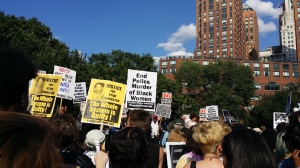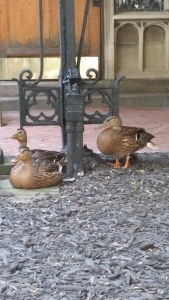The Episcopal Church uses the lectionary to select our readings every Sunday. Today many Episcopalians heard 2 Samuel 11:1-15. This is the story of David impregnating Bathsheba and then having her husband killed to “hide” this. It is a deeply disturbing story about the way that power corrupts people, even David. He was God’s anointed one – he was supposed to be God’s holy one bringing the Israelites into new age of peace and prosperity. Yet he did this.
One of the things that struck me about this passage is that it starts with the phrase “when kings go out to battle” yet David, the King, didn’t go out to battle. He sent his army to fight for him. He stayed safe in Jerusalem where he had the leisure to impregnate other men’s wives despite already being married to multiple women. He was not on the front line, the front line was the place where he gained his fame by defeating the giant, Goliath, in battle. He led the Israelites through many successful battles yet now he was simply staying in Jerusalem.
When Bathsheba told David that she was pregnant he tried to “do the right thing” by getting her husband to come back and sleep with her so that he would think it was his child. Yet this soldier would not – he could not bring himself to have simple pleasures while knowing that his brothers were fighting. David was not only not on the front line, he had lost the sense of urgency of battle. He thought that his place was lounging in Jerusalem while others sought freedom was the correct place to be. This soldier’s commitment to and solidarity with his brother’s fighting caused his death. He did not know it – but he carried his own death warrant back to battle.
David was doing terrible things – sleeping with Bathsheba (perhaps against her will?) and then killing her husband to cover it up. Yet it did not get covered up, perhaps it is the most famous and well known example of adultery in Western culture. This sin that he attempted to hide has become infamous.
Despite all of that, David goes down in history has the forerunner of the messiah. His son, Solomon, would build the temple. He was the king that wrote the psalms. He has a deeply flawed and problematic history but he was still able to do God’s will. Clearly in that instance he had forgotten the importance of being in the midst of struggle and strife. When we remove ourselves from the suffering of the world we cannot serve the world. When we start to believe that it is our right to be comfortable – to be insulated against the very real wars that was killing people we make choices that kill more people. We become complacent and cover our initial sin with more sin. David lost connection to pain and suffering and became complicit in sin. As I battle for injustice I need to make sure I continually evaluate myself to see if I am like Uriah – on the front line or if I am called back to Jerusalem for a time that I am always looking for ways to be in solidarity with those that are on the front line or if I am like David – I “served” my time on the front line and have now moved to place of power and so I no longer need to go out. I no longer need to be experience the battle. But even when I fall into being like David God can still use me and my work. God can redeem (and does redeem) all people. David was a murdering adulterer yet he also was a forefather of Jesus. I pray that most days I choose to be like Uriah despite the risk but know that when I fail God redeems me.






